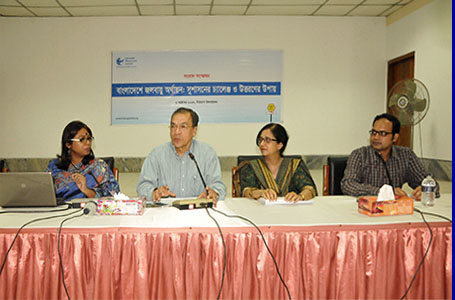Published: 03 October 2013
TIB urged the government and concerned authorities to immediately address  governance challenges in climate finance to reduce risks of corruption at different stages of project formulation, selection and implementation and fund disbursement. TIB urged this at the press launch of a study titled “Climate Finance in Bangladesh: Governance Challenges and Way Forward” on 3rd October 2013 at the CIRDAP auditorium. This report was prepared based on the findings generated through monitoring of fund flow, tracking of projects one from Bangladesh Climate change Trust Fund (BCCTF) and another from Bangladesh Climate Change Resilience Fund (BCCRF). It also identified governance challenges in the approvals and relation of projects submitted by NGOs and think tanks by the Board of the BCCTF and assessing quality of implementation of three selected projects under BCCTF funding. The study revealed a number of irregularities, nepotism and incidences of corruption at different stages of project formulation, NGO selection and implementation.
governance challenges in climate finance to reduce risks of corruption at different stages of project formulation, selection and implementation and fund disbursement. TIB urged this at the press launch of a study titled “Climate Finance in Bangladesh: Governance Challenges and Way Forward” on 3rd October 2013 at the CIRDAP auditorium. This report was prepared based on the findings generated through monitoring of fund flow, tracking of projects one from Bangladesh Climate change Trust Fund (BCCTF) and another from Bangladesh Climate Change Resilience Fund (BCCRF). It also identified governance challenges in the approvals and relation of projects submitted by NGOs and think tanks by the Board of the BCCTF and assessing quality of implementation of three selected projects under BCCTF funding. The study revealed a number of irregularities, nepotism and incidences of corruption at different stages of project formulation, NGO selection and implementation.

Ms Mohua Rauf, Assistant Coordinator of Climate Finance Governance Project (CFGP), presented the findings of the study. Dr Iftekharuzzaman, Executive Director; Dr Sumaiya Khair, Deputy Executive Director, TIB; Mr Zakir Hossain Khan, Coordinator and Mr Md Mahfuzul Haque, Research Associate, CFGP, TIB were also present.
According to the study till 2013, Bangladesh received only US$ 594 million from Annex-1 countries as commitment under Bangladesh Climate Change Strategic Action Plan (BCCAP). Mentionable that the country, till June 2013 received US$ 147 million under Bangladesh Climate Change Resilience Fund (BCCRF) against commitment of US$ 170 million for 11 ongoing projects. On the other hand, government from its own source under Bangladesh Climate Change Trust Fund (BCCTF) implemented 139 projects at cost of US$ 340 million and received US$190.78 million till June 2013 for implementing 139 GoB and 63 NGO projects across the country.
Studying the governance practices of the World Bank led BCCRF project, the report revealed a number of challenges including faulty disclosure of information, nominal involvement of affected people in project implementation process, political influence in selecting contractors, violation of public procurement rules, lack of accountability and proper monitoring in project implementation; poor quality of construction lack of accountability due to absence of effective complaint redresses mechanisms. Apart from these irregularities, the study also identified project finance being disbursed as credit assistance contrary to principles of climate finance.
The study came up with a set of recommendations including highest disclosure of project related information; inclusion of affected people at every stage of project formulation and implem

entation; establish complain mechanism and quick disposal of complains. For NGO implemented projects, TIB recommended setting up a watchdog body like an integrated national platform in addition to existing selection and approval committee, full freedom to Palli Karma Shahayok Foundation (PKSF) in selecting NGOs, on the basis of their competency, quick disposal of funds and above all zero political pressure and exemplary punishment in case of any corrupt practice.







